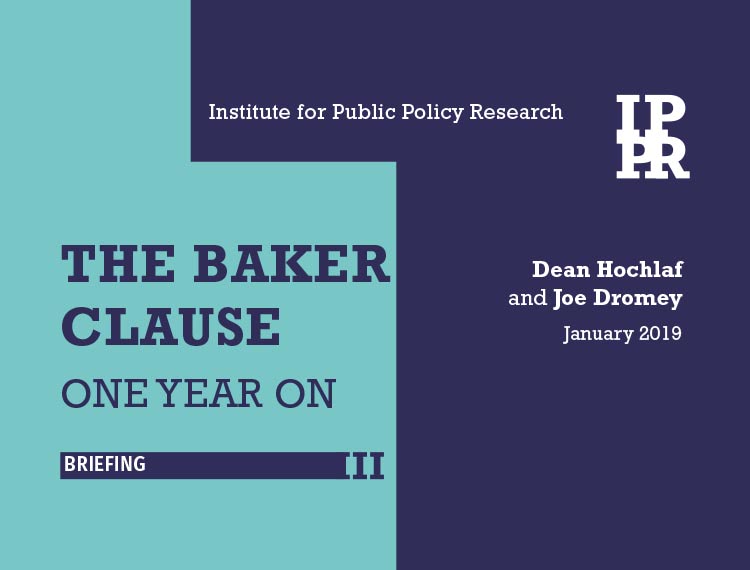The Baker clause: One year on – Sector Response

In recent years, there has been an increasing focus on the need to improve the technical education system in England.
Successive governments have recognised the importance of a high-quality technical route to ensure that all young people can achieve their potential, and to ensure that the next generation of young people entering the workplace are equipped with the skills they need to succeed in the economy of the future.
Over the last few years, the government has acted not only to improve the quality of technical education, but also to ensure that it is recognised as equally valid and important as traditional academic routes.
Building on the recommendations of the Sainsbury Review, the government introduced the Technical and Further Education Act 2017. Incorporated into the act is an amendment proposed by the former education secretary, Lord Baker.
Having come into effect on 2 January 2018, the new law, commonly known as the Baker clause, stipulates that schools must ensure that a “range of education and training providers” have access to pupils from year 8 to year 13, so that they can be informed about what technical education and apprenticeship opportunities are available to them.
However, there has been growing concern that compliance with the legislation has been poor. One year on from the introduction of the Baker clause, this report explores the impact of the new legislation.
It sets out what can be done to improve compliance with the Baker clause and to deliver on the aspirations of the legislation by ensuring that all young people understand the range of options and can make the right choices that reflect their passions, skills and aspirations.
The Baker Clause requires schools to ensure that pupils have the opportunity to speak to further education providers about post-16 options.
DfE have published new statutory guidance which explains in detail what schools are required to do to comply with the Baker Clause. They are investing over £70m each year until 2020 to support young people and adults with career advice and support.
This includes funding for the National Careers Service and the Careers & Enterprise Company.
A Department for Education spokesperson said:
We want young people to know about the amazing opportunities available to them in technical education. That is why we introduced the Baker Clause, to make sure they are able to meet University Technical Colleges, apprenticeship providers and further education colleges, helping them understand the options open to them.
If a school does not provide their students with this information, we have been clear that we will take appropriate action.

Judith Doyle, principal and CEO at Gateshead College, said:
We have great working relationships with certain schools, but the picture is very patchy, and we still encounter resistance from too many schools. It is time to ensure that every schools complies with the law; it is in the best interests of the pupils.
The Baker Clause was designed to mitigate against the financial incentive for schools to retain students in their own sixth forms and discourage them from following vocational routes.
Our own local research combined with the new national findings of the IPPR mean young people and their parents are not getting good, independent fact-based careers advice. How can they make informed decisions if they’re not presented with all the career options available to them?
We really want to work with schools to help them meet these obligations. I hear every day from business leaders that having a skilled workforce is crucial to their business success and the low participation in technical education is a major barrier to this.

Lord Kenneth Baker, said:
The IPPR Report on the impact of the Baker Clause is excellent.
It has found that up to two-thirds of secondary schools are deliberately flouting and flagrantly disregarding the law of the land in not allowing the providers of technical education – FE Colleges, University Technical Colleges, Studio Schools and Apprenticeship providers – to go into their schools to talk to 14, 16 and 18-year-old students.
Many students in mainstream schools want a technical education which is no longer provided in secondary schools. The Baker Clause was a major step to improve career guidance and by ignoring it schools are denying the right of their students to know more about technical education. This is totally unacceptable for schools must open their doors to technical education providers.
Two things must be done urgently:
- OFSTED should be asked to report on whether a school has satisfactorily implemented the Baker Clause and career guidance should be rated from ‘Inadequate’ to ‘Outstanding.’
- The Department for Education must write immediately to all secondary schools asking them to report by March 31st 2019 on the arrangements they have put in place for alternative providers to speak to their students and thus fulfil the statutory duty.
It is very important that the providers should be able to speak to all relevant students during the summer term this year so that they have a chance to move into technical education in September.
The Government is committed to increasing technical education, but T-Levels will not produce any qualified technicians and engineers until 2023. Action is needed today to increase high quality technical education.

Charles Parker, CEO Baker Dearing Educational Trust, Said:
University Technical Colleges (UTCs) welcome the report and recommendations published today by the Institute of Public Policy Research (IPPR). IPPR is correct. Most schools deny their students the opportunity to hear about technical education pathways offered by UTCs at 14 and 16. Worse still they often just put forward the students who they do not mind losing. Schools always claim that they put the interests of their students first. That is not true in this case.
UTCs are making rapid and exciting progress in modern technical schooling. For the fourth year running, our 18-year-old leavers are going on to fabulous destinations, either by starting STEM undergraduate courses or starting great apprenticeships with top technical employers or by going straight to work. Yet most parents and students still don’t know about the opportunities presented by UTCs. This needs to change. We want to see amendments to the regulations, which strengthen enforcement and penalties for non-compliance.
We want to see the following;
- Access to all schools and all students to tell them about our offer
- Local Authorities must be obliged regularly to distribute our prospectuses to parents of students in Years 8, 9 and 11
- Ofsted should assess compliance with the Baker Clause as part of its new framework
Government must help employers deal with the skills shortage. There is strong and growing evidence that UTCs do this. What on earth is the point of passing laws without teeth?

Catherine Sezen, Senior Policy Manager at the Association of Colleges, said:
Colleges frequently report the challenges they still have accessing all students in some or all of their local schools. This is often down to a lack of awareness of the college offer and a degree of competition when the 16-year-old demographic is low. In the short term, making compliance with the Baker Clause part of an inspection visit will impact on school behaviour; schools will be more likely to comply, but not all schools are inspected very regularly, certainly not good/outstanding schools. School based CPD and encouraging school teaching staff to visit colleges and learn about progression opportunities would be a positive way forward. Area accountability for student destinations and outcomes at age 18/19 might also help.
Funding is an issue for both schools and colleges, but working together will benefit all students. Not asking/allowing colleges to speak to all students doesn’t have any cost implications for schools and will help them to achieve the Gatsby benchmarks. The Baker clause has focused attention on the importance of impartial IAG for all school students. With the introduction of T Levels this will become even more crucial.

Mark Dawe, Chief Executive, Association of Employment and Learning Providers, said:
The IPPR has correctly identified that better partnership working with local providers is the key to securing improvements. However local arrangements should be consistent across local authority maintained schools and academies.
AELP agrees that a major concern is providers not being all able to talk to pupils of all abilities while gender stereotyping also remains a big issue. With the current debate on whether all HE courses deliver value for money and apprenticeships now being available up to and including degree level, it is vital that young people have access to impartial information on all of the routes available to them.
We never expected the Baker Clause to be transformational in its first year, as Lord Baker himself warned when introducing his amendment, but AELP and ASCL have issued joint guidance for schools and providers to encourage improved access to advice about alternative paths to a successful career. Partnerships are always challenging at first in that it takes both sides to agree how to work, but following the guidance should avoid any additional burden on school budgets.

Dr. Deirdre Hughes OBE, Director, DMH & Associates Ltd, said:
The IPPR report is a welcome development. It puts the spotlight on careers provision in England and calls for major improvements. The authors indicate if we are to deliver on the promise of the Baker clause, government should make Ofsted responsible for checking compliance, as part of a greater focus on careers guidance.
In 2014, the National Careers Council reported: “Government could exercise control over the segment in the careers marketplace that it funds directly to help compensate for ‘market failure’” (p.16, Taking Action: Achieving a culture change in careers provision). This concurs with key recommendations in this report.
There is broad consensus that Ofsted should prioritise the inspection of careers work in schools. But, fundamentally there should be a level playing field for all providers. Ofsted should include the work of the Careers and Enterprise Company who receive the bulk of funding from government for careers support in schools. At present there is no inspection.
IPPR make an important point “Government should also ensure that schools are sufficiently funded to provide high quality careers information, advice and guidance” (p.16). The Gatsby ‘Good Guidance’ pilots in the North East of England provided direct funding to schools. Current funding arrangements for schools are inconsistent and, in some cases, simply being left to chance.

Alice Barnard, CEO, Edge, said:
It’s deeply disturbing that despite the introduction of the Baker clause intended to expose students to a broader range of post-16 options, the majority of young people are still being denied the information, advice and guidance they need to make informed choices about their futures. A greater role for Ofsted to ensure compliance and a ‘one-stop-shop’ portal where both young people and their families could access balanced, quality careers information are both welcome recommendations, but the IPPR’s report highlights wider curriculum issues.
If young people are to be able to find their passion and articulate their career ambitions, they need a broad and balanced curriculum which includes technical and creative subjects and makes learning relevant to the world of work. Careers information, advice and guidance, profound employer engagement and work experience should be at the heart of the curriculum throughout school. The introduction of T-Levels and an arbitrary three million apprenticeship target look rather ludicrous in the context of the Government’s commitment to the EBacc which imposes a narrow academic diet on students, regardless of their talents, interests or aptitudes.

Responses